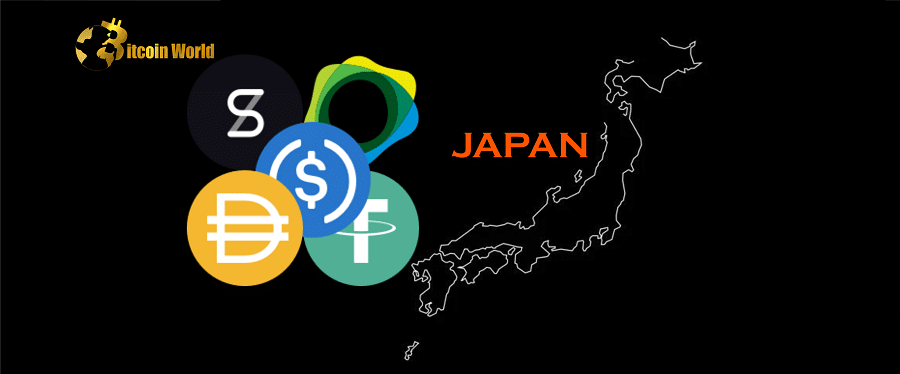Exciting news for crypto enthusiasts in Japan! Are you ready for a potential shake-up in the Japanese digital asset landscape? It appears Japan’s top financial watchdog is considering a significant shift that could open doors for major stablecoins like Tether (USDT) and USD Coin (USDC). Let’s dive into what this could mean for the future of crypto in the Land of the Rising Sun.
Is Japan Finally Embracing Global Stablecoins?
According to reports from Japanese local media, the Financial Services Agency (FSA), Japan’s primary financial regulator, is planning to potentially remove its ban on the domestic distribution of stablecoins issued outside of Japan as early as 2023. This is a significant development as it could pave the way for Japanese investors to access a wider range of stablecoins, including some of the most popular ones globally.
This potential policy change stems from a thorough review of Cabinet Office ordinances by the FSA. Furthermore, the agency is committed to establishing clear and robust guidelines in line with the recently updated Revised Payment Services Act. This suggests a thoughtful and measured approach to integrating foreign stablecoins into the Japanese financial system.
Why the Change of Heart? Understanding the FSA’s Perspective
The FSA’s decision to reconsider its stance on foreign stablecoins comes after a detailed investigation into stablecoins and their potential effects on Japan’s financial stability. It seems the regulator is now leaning towards a framework that allows for controlled access to these digital assets while prioritizing consumer protection and financial security.
Here’s a breakdown of the key points regarding the FSA’s approach to foreign-issued stablecoins:
- Local Supervision: Instead of directly regulating foreign issuers, the FSA plans to supervise local distributors of these stablecoins. This means companies within Japan that facilitate the distribution of foreign stablecoins will be held accountable for compliance and consumer protection.
- Consumer Protection Focus: The primary aim is to safeguard consumers. Local distributors will be responsible for ensuring the stability of the stablecoin’s value.
- Reserve Requirements: Distributors will be mandated to maintain sufficient reserves to back the stablecoins they distribute, ensuring users can redeem their stablecoins as expected.
- Transaction Limits: To manage risk, a transaction limit of 1 million Yen is expected to be imposed on remittances facilitated by these foreign stablecoins. This measure likely aims to mitigate large-scale financial risks.
Anti-Money Laundering Measures: Ensuring a Secure Ecosystem
In today’s global financial landscape, anti-money laundering (AML) is a critical concern. The FSA is taking proactive steps to address this in the context of stablecoins. Distributors of foreign stablecoins will be required to disclose specific transaction information to the FSA. This includes identifying details related to transactions, acting as a crucial AML measure to enhance transparency and deter illicit activities.
What About Stablecoins Issued in Japan?
The regulatory landscape for stablecoins issued within Japan is slightly different. Issuers of domestic stablecoins will be obligated to prepare collateral assets to back their digital currencies. Interestingly, the regulations currently limit stablecoin issuance to specific types of entities:
- Banks
- Fund transfer service providers
- Trust companies
This cautious approach to domestic issuance reflects a desire to maintain stability and control within the Japanese financial system.
The Potential Impact: A Boost for Japan’s Crypto Scene?
The FSA’s move to potentially lift the ban on foreign-issued stablecoins is widely considered a positive signal for Japan’s cryptocurrency industry. Here’s why this decision could be significant:
- Increased Access for Investors: Japanese investors will gain access to a broader spectrum of stablecoins, including market leaders like Tether (USDT) and USD Coin (USDC). This increased choice can cater to diverse investment and trading strategies.
- Enhanced Market Competition: Opening up the market to foreign stablecoins is expected to intensify competition within the stablecoin sector in Japan. This could potentially lead to lower fees and more innovative services for consumers.
- Validation of Digital Assets: This regulatory shift signals a growing acceptance and integration of digital assets within Japan’s financial framework. It demonstrates that Japan is actively seeking to participate in the evolving global crypto landscape.
Building on Previous Progress: Japan’s Forward-Thinking Approach
It’s important to remember that Japan has been proactively shaping its crypto regulations. In June 2022, Japan took a significant step by passing landmark legislation specifically addressing stablecoins. This legislation established a legal and regulatory framework for the use of these digital assets within the country. The potential lifting of the foreign stablecoin ban can be seen as a continuation of this forward-thinking approach, further refining and adapting Japan’s crypto policies.
Looking Ahead: What to Expect
While the final details are still awaited, the direction seems clear. Japan is moving towards a more open and regulated stablecoin market. As we move into 2023, keep an eye out for further announcements from the FSA regarding the specific guidelines and implementation timeline for these changes. This could be a pivotal year for cryptocurrency adoption and growth in Japan.
In summary, Japan’s potential decision to lift the ban on foreign stablecoins marks a potentially significant turning point for its crypto industry. By focusing on local distributor supervision, consumer protection, and AML measures, the FSA appears to be crafting a balanced approach that encourages innovation while mitigating risks. This development could bring greater choice, competition, and dynamism to Japan’s digital asset ecosystem, making it a space to watch closely in the coming months.
Disclaimer: The information provided is not trading advice, Bitcoinworld.co.in holds no liability for any investments made based on the information provided on this page. We strongly recommend independent research and/or consultation with a qualified professional before making any investment decisions.




